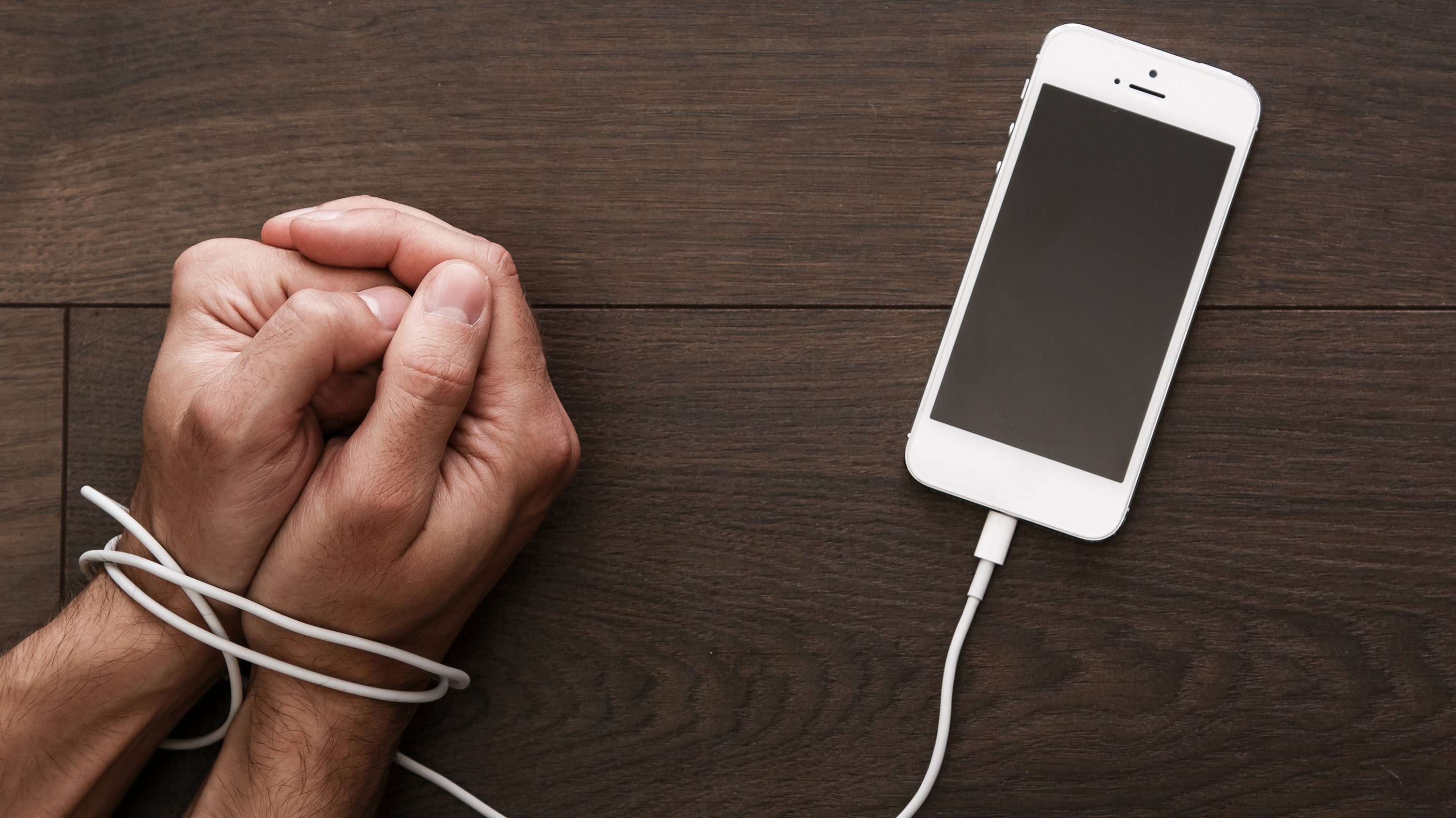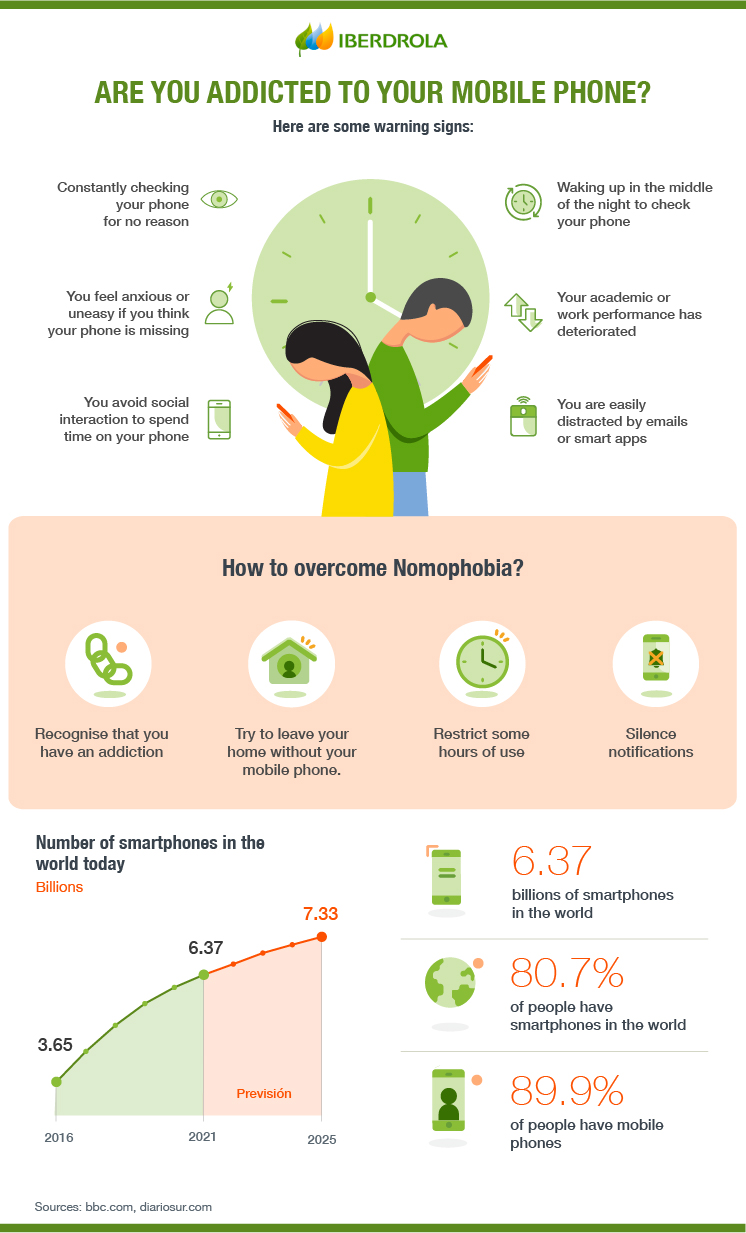Nomophobia
Nomophobia: the irrational fear of being without a mobile phone
The use of mobile phones has been growing exponentially in recent years, especially after the emergence of smart devices. Smartphones are now our companions for work, social, leisure and even family life. However, excessive use can lead to problems of dependence, addiction and fear.

If we stop to think about what we look at most during the day, the answer would probably not be our family or friends, nor television or books. The most feasible option would be the mobile phone. That small device that forms a large part of our lives with work emails, instant messages, social networks or videos on demand. In extreme cases, it can lead to what is known as "nomophobia", a disorder that experts have described as the disease of the 21st century.
What is nomophobia?
Nomophobia represents the irrational fear of being without a mobile phone. The term was coined in 2009 in the UK and comes from the anglicism "nomophobia" ("no-mobile-phone-phobia"). The dependence on the electronic device causes an unfounded sense of communication in the user who does not have the device, either because they have left it at home, the battery has run out or they are out of range. In this vein, a YouGov Real Time study in 2019 found that 44% of Britons surveyed were anxious if they could not use their mobile phone to "keep in touch" with their circle.
Although the WHO has not yet classified nomophobia as a mental pathology, experts warn of the growing dependence on this small electronic device since the appearance of smartphones. The growth of these smartphones has been exponential. Statista puts the current number of smartphone users in the world at 6.37 billion, which means that 80.7% of the global population has one of these devices, compared to 3.67 billion in 2016, only 49.4% of the world's population. Experts agree that this increase, together with the ease of Internet connection, has been the seed of the development of this technological dependence.
The most common psychological consequences of nomophobia are anxiety, depression or isolation –mobile phones are thought to keep us in touch with others, but the problem arises when online relationships replace face-to-face ones. There are also physical consequences such as headaches, stomach aches, eye discomfort due to overexposure to the screen, or wrist and neck pain due to improper positioning.
Researchers have developed a nomophobia test to determine the symptoms generated by this disorder. The questionnaire asks respondents to rate the extent to which they agree or disagree with statements such as:
- "I would feel uncomfortable without constant access to information through my mobile phone".
- "Running out of battery power would scare me".
- "I would feel anxious because I would not be able to keep in touch with my family and/or friends".

SEE INFOGRAPHIC: Are you addicted to your mobile phone? [PDF]
Causes and profile of nomophobes
Among the most recognised causes of mobile phone addiction are low self-esteem and problems in maintaining social relationships. In fact, personal insecurity is the most common factor that causes nomophobia, as many young people become absolutely dependent on others and find in their mobile phones a way to be present in their social circle. Perfectionism is another reason for this disorder, as sufferers feel the need to perform without making a single mistake. For example, if this type of user receives a call and they do not have their mobile phone at hand, they feel that they are disappointing and fear takes hold of them.
Anyone can suffer from nomophobia. However, this disorder tends to affect adolescents the most, with the 14-16 age group being the most prevalent. Younger generations are more at risk of becoming nomophobic for two reasons: they feel a strong need to be accepted by others and they are more familiar with new technologies than older people.
Adam Alter, a psychologist at New York University, has extensively researched the impact of nomophobia on teenagers. The author of Irresistible: The Rise of Addictive Technology and the Business of Keeping Us Hooked conducted a study in 2017 in which he asked a sample of these young people whether they would rather see their mobile phone fall and break into a million pieces or break a bone in their hand. The author found that older participants prioritised their health over replaceable comfort. In contrast, around 40 to 50 per cent of the teenagers preferred breaking their bones to having their mobile phone broken. In addition, the expert observed that these young people asked questions such as which hand would be affected by the injury or whether they could continue to use the phone and scroll with the broken bone.
Prevention and treatment of nomophobia
As with all addictions, prevention is the key. There are some simple actions to prevent excessive use of mobile phones from leading to extreme dependence or a major disorder. Among the most effective are the following:
Uninstall some applications that we consider to be time-wasters such as games.
Do not use at mealtimes.
Mute notifications.
Set specific times to consult it and decrease the time of use.
Never look at it if we are chatting, eating, sharing leisure time with other people.
Do not use it as an alarm clock, as it can interfere with our sleep cycle.
Carry it out of the bedroom.
Going out on the streets without a telephone.
It is essential that we accept that we cannot have our mobile phones at our disposal at all times and that we create our own commitment to the healthy use of technology. In the most extreme cases, we should see a specialist. Treatment will depend on each person's level of self-control. If this still exists, we will proceed to the progressive elimination of dependence on the mobile phone. If it is no longer possible to manage the anxiety, the treatment will be a shock treatment supervised by a mental health specialist who will help to cope with the negative feelings while disengagement is achieved.




